高一定语从句 40个常考不及物动词 与介词固定搭配
高一英语必修一unit4定语从句

Do you know the girl in our class? Her hair is very short. Do you know the girl whose hair is very short in our class? He is the student. I broke his pencil yesterday. He is the student whose pencil I broke yesterday.
refere
nce
(4) 先行词是who或which引导的主句。 Who is the girl that drove the car? Who that broke the window will be punished? Which is the T-shirt that fits me most? Who is the man that is reading the newspaper over there?
• Mr. Turner is an artist. • She became a lawyer.
主系表
主谓双宾 主谓双宾 主谓宾宾补
• He gave his sister a book.
• I'll write you a long letter.
• I found the book easy. • I'll let him go.
refere
nce
that和which在指物的情况下一般都 可以互换,但在下列情况下,一般用 that而不用which。
(1) 限制性定语从句中先行词为all, everything, anything, nothing, none, few, little, some等不定代词指物时。 (something用that或which均可) Have you taken down everything that Mr. Li said? There seems to be nothing that is impossible to him in the world.
人教版高一英语必修二语法unit5-定语从句(4)介词+关系代词

e.g. The school in which he once studied is very famous.
他曾经上学的学校非常著名。
The girl about whom we are talking is a doctor.
我们正在谈论的那个女孩是个医生。
[即时演练1] 用“介词+关系代词”填空
介词+关系代词: 介词的选择
3. 根据主从句的句意确定介词
Air, without which man can’t live, is really important. The pen, with which he is writing now, was bought yesterday.
This is my pair of glasses, without which I cannot see clearly.
= of which the roof is red.
I know a boy whose father is a doctor. = the father of whom is a doctor. = of whom the father is a doctor.
三、“介词+关系代词”的拓展 1.复杂介词+关系代词 用于该结构中的关系代词有which, whom和whose。常用的 复杂介词有because of, in front of, as a result of, at the back of 等。 He was badly hurt in the accident, because of which he didn't go to work. 他在事故中严重受伤。因此,他没去上班。 They arrived at a farmhouse, in front of which sat a boy. 他们来到一座农舍,农舍前面坐着一个男孩。
高一英语:定语从句归纳总结
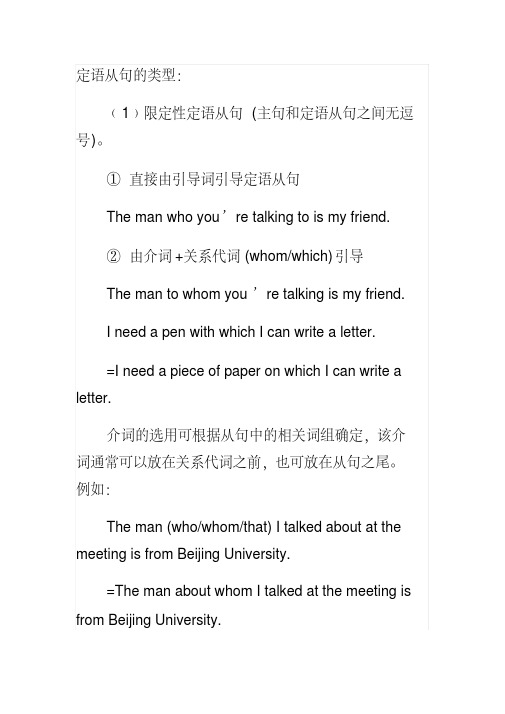
定语从句的类型:﹙1﹚限定性定语从句(主句和定语从句之间无逗号)。
①直接由引导词引导定语从句The man who you’re talking to is my friend.②由介词+关系代词(whom/which)引导The man to whom you’re talking is my friend.I need a pen with which I can write a letter.=I need a piece of paper on which I can write a letter.介词的选用可根据从句中的相关词组确定,该介词通常可以放在关系代词之前,也可放在从句之尾。
例如:The man (who/whom/that) I talked about at the meeting is from Beijing University.=The man about whom I talked at the meeting is from Beijing University.The palace (which/that) I often pay a visit to was built in the 17th century.=The palace to which I often pay a visit was built in the 17th century.﹙2﹚非限定性定语从句(主句和定语从句之间用逗号隔开)。
①直接由引导词引导定语从句。
②由介词+关系代词(whom/which)引导。
I live in a house far away from the city,in front of which is a big tree.There is an apple tree standing at the gate,on which are many apples.This is the man to whom I gave the book.③由“代词/名词+of+whom/which”或“of which/ whom +名词/代词”(先行词指人用whom,指物用which)引导。
定语从句不及物动词以及特殊情况的被动语态
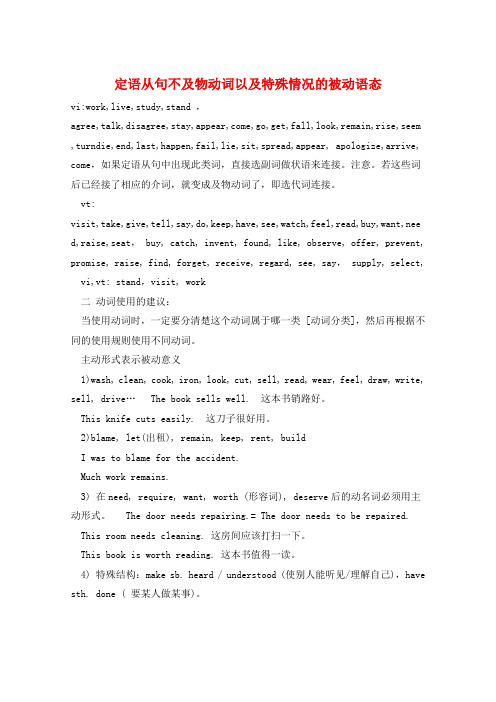
定语从句不及物动词以及特殊情况的被动语态vi:work,live,study,stand ,agree,talk,disagree,stay,appear,come,go,get,fall,look,remain,rise,seem ,turndie,end,last,happen,fail,lie,sit,spread,appear, apologize,arrive, come,如果定语从句中出现此类词,直接选副词做状语来连接。
注意。
若这些词后已经接了相应的介词,就变成及物动词了,即选代词连接。
vt:visit,take,give,tell,say,do,keep,have,see,watch,feel,read,buy,want,nee d,raise,seat, buy, catch, invent, found, like, observe, offer, prevent, promise, raise, find, forget, receive, regard, see, say, supply, select, vi,vt: stand,visit, work二动词使用的建议:当使用动词时,一定要分清楚这个动词属于哪一类 [动词分类],然后再根据不同的使用规则使用不同动词。
主动形式表示被动意义1)wash, clean, cook, iron, look, cut, sell, read, wear, feel, draw, write, sell, drive… The book sells well. 这本书销路好。
This knife cuts easily. 这刀子很好用。
2)blame, let(出租), remain, keep, rent, buildI was to blame for the accident.Much work remains.3) 在need, require, want, worth (形容词), deserve后的动名词必须用主动形式。
及物不及物动词、时态、非谓语动词和介词搭配
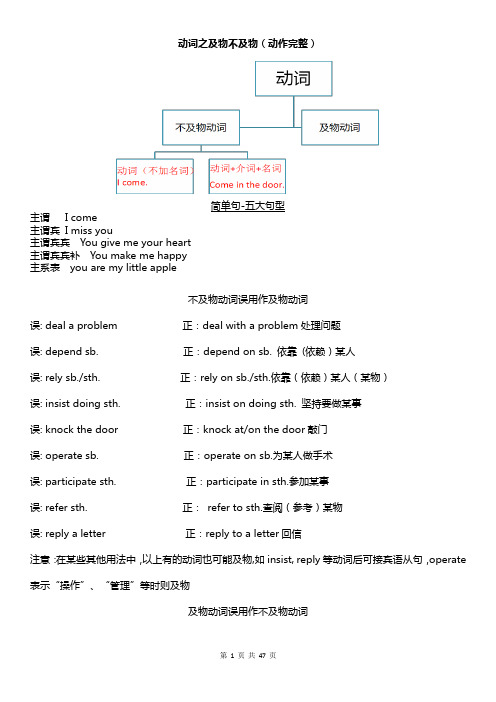
动词之及物不及物(动作完整)简单句-五大句型主谓I come主谓宾I miss you主谓宾宾You give me your heart主谓宾宾补You make me happy主系表you are my little apple不及物动词误用作及物动词误: deal a problem 正:deal with a problem处理问题误: depend sb. 正:depend on sb. 依靠(依赖)某人误: rely sb./sth. 正:rely on sb./sth.依靠(依赖)某人(某物)误: insist doing sth. 正:insist on doing sth. 坚持要做某事误: knock the door 正:knock at/on the door敲门误: operate sb. 正:operate on sb.为某人做手术误: participate sth. 正:participate in sth.参加某事误: refer sth. 正:refer to sth.查阅(参考)某物误: reply a letter 正:reply to a letter回信注意:在某些其他用法中,以上有的动词也可能及物,如insist, reply等动词后可接宾语从句,operate 表示“操作”、“管理”等时则及物及物动词误用作不及物动词动词原形-非谓语动词-谓语动词go going,to go,gone goes,went,will go等动词原形非谓语动词谓语动词六.非谓语动词测试1.The island, C to the mainland by a bridge,is easy to go to.A joiningB to joinC joinedD having joined解答:1.两个逗号之间的部分为后置定语,修饰句子主语the island.2.句子主语the island和非谓语动词join之间为被动关系(后面的by a bridge也暗示了这一点), 即:join the island to the mainland其中含有一个固定搭配:join A to B这也证明了the island和join之间为动宾关系,两者倒过来即被动关系.3.根据英语语法,所以选用过去分词joined构成的短语做the island的后置定语2. Sarah pretended to be cheerful, D nothing about the argument.A saysB saidC to sayD saying3. While walking (walk)his dog in the park yesterday afternoon,Bob heard someone shouting for help in the distance.4. I am not interested in pop music,because I often have difficulty in understanding(understand)the words.to do的意义语态:主动to do状态:未发生I want to go to visit my friend.She invited me to come.To catch the bus,he ran as fast as he can.目的状语doing的意义语态:主动doing状态:已发生He finished reading the book yesterdayThe woman giving us oral lessons is from America. = The woman who gives us oral lessons is from America.Walking along the street,we found a purse lying on the ground.=When we walked along the street,we found a purse lying on the ground.小测:To do PK doingHe is advised (stop)(think of)(go)abroad in these two years.done的意义语态:被动done状态:已发生,完成A retired teacher is cleaning the fallen leaves at school. 完成一位退休教师在清理学校的落叶。
必修一、必修二定语从句 介词加关系代词
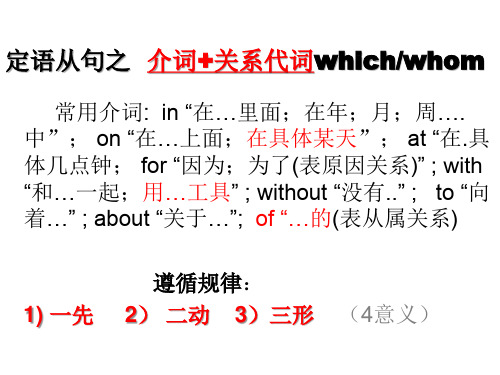
1) 一先
(4意义)
一:“一先” : 从先行词跟介词的搭配习惯或联系
1) The day on which/when Tom went to college was wonderful for him.(在具体的某一天用介词on) 2)The boy was educated at the high school, after which he went on to Beijing University.(从高中毕 业后用介词after). 3)Did you find the pen with which I wrote just now? (使用工具用介词with) 4) The reason why /for which Rose was late was that she couldn’t catch the first bus.(因为…原因 reaso词对介词的习惯 1)The computer for which I paid 5,000yuan is made in Shenzhen. ( pay 与for搭配) 2) Out there was a policeman ,to whom John could turn for which way he’ d like to go.(turn to sb.向 某人求助) 3)Do you know the girl ,with whom Jack shook hands just now? (shake hands with sb.和…人握 手)
定语从句之 介词+关系代词which/whom
常用介词: in “在…里面;在年;月;周…. 中”; on “在…上面;在具体某天”; at “在.具 体几点钟; for “因为;为了(表原因关系)” ; with “和…一起;用…工具” ; without “没有..” ; to “向 着…” ; about “关于…”; of “…的(表从属关系)
高一英语:定语从句归纳总结
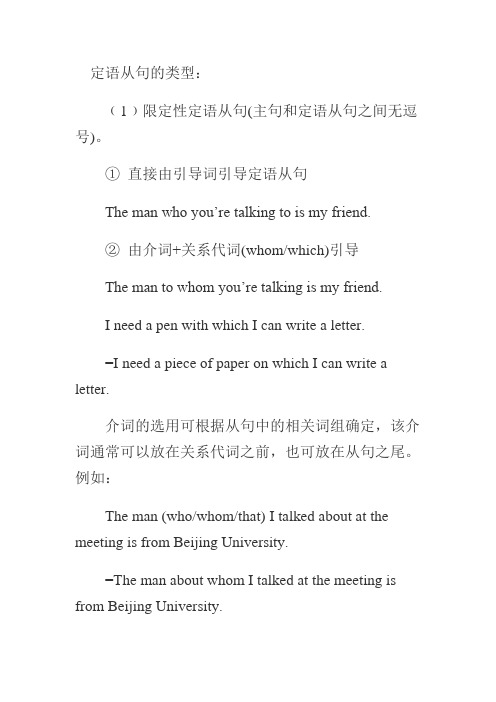
定语从句的类型:﹙1﹚限定性定语从句(主句和定语从句之间无逗号)。
①直接由引导词引导定语从句The man who you’re talking to is my friend.②由介词+关系代词(whom/which)引导The man to whom you’re talking is my friend.I need a pen with which I can write a letter.=I need a piece of paper on which I can write a letter.介词的选用可根据从句中的相关词组确定,该介词通常可以放在关系代词之前,也可放在从句之尾。
例如:The man (who/whom/that) I talked about at the meeting is from Beijing University.=The man about whom I talked at the meeting is from Beijing University.The palace (which/that) I often pay a visit to was built in the 17th century.=The palace to which I often pay a visit was built in the 17th century.﹙2﹚非限定性定语从句(主句和定语从句之间用逗号隔开)。
①直接由引导词引导定语从句。
②由介词+关系代词(whom/which)引导。
I live in a house far away from the city,in front of which is a big tree.There is an apple tree standing at the gate,on which are many apples.This is the man to whom I gave the book.③由“代词/名词+of+whom/which”或“of which/ whom +名词/代词”(先行词指人用whom,指物用which)引导。
高一定语从句40个常考不及物动词与介词固定搭配
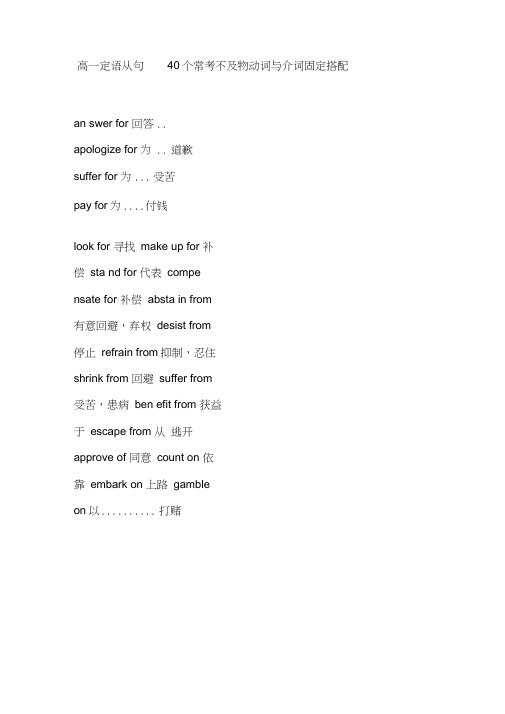
高一定语从句40个常考不及物动词与介词固定搭配an swer for 回答..apologize for 为 .. 道歉suffer for 为... 受苦pay for为.... 付钱look for 寻找make up for 补偿sta nd for 代表compensate for 补偿absta in from有意回避,弃权desist from停止refrain from抑制,忍住shrink from 回避suffer from受苦,患病ben efit from 获益于escape from 从逃开approve of 同意count on 依靠embark on 上路gambleon以.......... 打赌in sist on 坚持rely on依靠theorize on对.... 推理,对建立理论harp on 老提至U ...calculate on扌旨望,依靠concen trate on 集中至U ..depe nd on 依靠reckon on盼望,指望...account for说明,解释....boast of 吹牛consist of 由 ... 组成despair of 失望dream of梦想做某事repe nt of忏悔,懊悔believe in 相信 ...persevere in 坚持...revel in陶醉,着迷于 ...succeed in在某方面成功delight in 为.... 高兴join in 力口入... participate in 参力口persist in 坚持....specialize in专门从事某事,aim at瞄准于 ...chafe at恼怒,不满frown at向.... 皱眉头scowl at沉下脸.... ,对 ... laugh at 嘲笑smile at向... 微笑work at从事于 .... ,用功于look at 看着...atte nd to 参力口certify to 证明...con fess to 承认... descend to 下降至U .. object to 反对...react to对某事作出反应refer to 提到 ..resort to求助,采用.... see to检查 ...submit to 提交... 在某方面专长皱眉testify to表明,说明 .. turn to 转向...fall to下跌,减弱。
- 1、下载文档前请自行甄别文档内容的完整性,平台不提供额外的编辑、内容补充、找答案等附加服务。
- 2、"仅部分预览"的文档,不可在线预览部分如存在完整性等问题,可反馈申请退款(可完整预览的文档不适用该条件!)。
- 3、如文档侵犯您的权益,请联系客服反馈,我们会尽快为您处理(人工客服工作时间:9:00-18:30)。
高一定语从句40个常考不及物动词与介词固定搭配
answer for回答……
apologize for为……道歉
suffer for为……受苦
pay for 为……付钱
look for 寻找
make up for补偿
stand for代表
compensate for 补偿
abstain from 有意回避,弃权
desist from 停止
refrain from抑制,忍住
shrink from 回避
suffer from 受苦,患病
benefit from 获益于
escape from 从……逃开
approve of 同意
count on 依靠
embark on上路
gamble on以……打赌
insist on坚持……
rely on依靠
theorize on 对……推理,对……建立理论harp on 老提到……
calculate on 指望,依靠
concentrate on 集中到……
depend on依靠
reckon on盼望,指望……
account for 说明,解释……
boast of 吹牛
consist of 由……组成
despair of 失望
dream of 梦想做某事
repent of 忏悔,懊悔
believe in 相信……
persevere in 坚持……
revel in 陶醉,着迷于……
succeed in 在某方面成功
delight in 为……高兴
join in 加入……
participate in 参加……
persist in 坚持……
specialize in 专门从事某事,在某方面专长aim at 瞄准于……
chafe at 恼怒,不满
frown at 向……皱眉头
scowl at 沉下脸……,对……皱眉
laugh at 嘲笑
smile at向……微笑
work at 从事于……,用功于……
look at 看着……
attend to 参加……
certify to 证明……
confess to 承认……
descend to 下降到……
object to 反对……
react to 对某事作出反应
refer to 提到……
resort to 求助,采用……
see to 检查……
submit to 提交……
testify to 表明,说明……
turn to 转向……
fall to 下跌,减弱。
